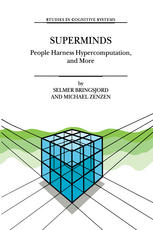

Most ebook files are in PDF format, so you can easily read them using various software such as Foxit Reader or directly on the Google Chrome browser.
Some ebook files are released by publishers in other formats such as .awz, .mobi, .epub, .fb2, etc. You may need to install specific software to read these formats on mobile/PC, such as Calibre.
Please read the tutorial at this link: https://ebookbell.com/faq
We offer FREE conversion to the popular formats you request; however, this may take some time. Therefore, right after payment, please email us, and we will try to provide the service as quickly as possible.
For some exceptional file formats or broken links (if any), please refrain from opening any disputes. Instead, email us first, and we will try to assist within a maximum of 6 hours.
EbookBell Team

4.8
44 reviewsThis is the first book-length presentation and defense of a new theory of human and machine cognition, according to which human persons are superminds. Superminds are capable of processing information not only at and below the level of Turing machines (standard computers), but above that level (the "Turing Limit"), as information processing devices that have not yet been (and perhaps can never be) built, but have been mathematically specified; these devices are known as super-Turing machines or hypercomputers. Superminds, as explained herein, also have properties no machine, whether above or below the Turing Limit, can have. The present book is the third and pivotal volume in Bringsjord's supermind quartet; the first two books were What Robots Can and Can't Be (Kluwer) and AI and Literary Creativity (Lawrence Erlbaum). The final chapter of this book offers eight prescriptions for the concrete practice of AI and cognitive science in light of the fact that we are superminds.